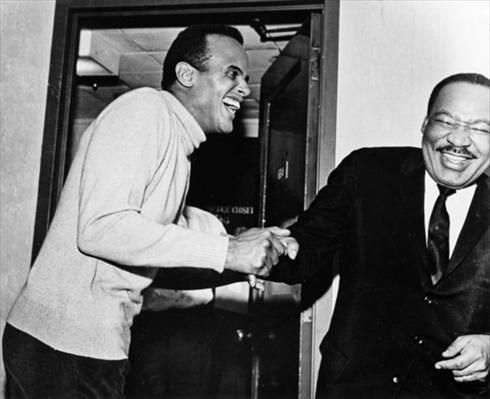HARRY BELAFONTE:
ARTIST AND ACTIVIST

MICHELE J MARTIN
Harry Belafonte is known affectionately as the "King of Calypso," but his real goal was to act. He started as a club singer in the 40's, performing with the Charlie Parker band, which at that time was comprised of Charlie Parker, Max Roach, and Miles Davis. His performances at The Village Vanguard, a legendary NYC jazz club, would get music labels' attention and earn him a contract with RCA Victor.
Belafonte's breakthrough album, Calypso (1956), was the first LP to sell over a million copies within a year and the first million-selling album in England. Featuring the now-iconic "Banana Boat Song" (also known as "Day-O"), Calypso was the first to introduce American audiences to the calypso music of Trinidad and Tobago. In 1959, he became the first Jamaican American to win an Emmy for his special — "Revlon Revue: Tonight with Belafonte."
Harry Belafonte was a civil rights activist before anything else. As a friend and confidante to Dr. King, Belafonte considered the Kings to be family; and he helped provide for them as the salary for a preacher was only $8,000 a year. Belafonte's generosity enabled Dr. King to continue his work as a civil rights advocate and activist.

"If I've impacted on one heart, one mind, one soul, and brought to that individual a greater truth than that individual came into a relationship with me having, then I would say that I have been successful."
His friendship with Dr. King and his outspoken opinions on civil rights issues resulted in his being blacklisted during the era of McCarthyism. However, this didn't deter him, and his actions in some of the pivotal moments of the civil rights movement are worth reiterating.
- During the 1963 Birmingham Campaign, Belafonte raised $50k to bail King and other civil rights protestors out of Birmingham City Jail.
- He helped to organize the 1963 March on Washington to advocate for the cibil and economic rights of Black Americans. It was here that Dr. Martin Luther King Jr. gave his historic speech — "I Have a Dream", with the Lincoln Memorial behind him.
- In 1964 Belafonte bankrolled the Student Nonviolent Coordinating Committee during what was known as the "Mississippi Freedom Summer".
The Civil Rights Movement wasn't the only place that Belafonte has given his attention. Over the last 40 years, he has continued to find ways to help causes in Africa, including education, healthcare, and apartheid.
- He helped organize the Grammy Award-winning song "We Are the World", a multi-artist effort in 1985 to raise funds for Africa.
- In 1987, he received an appointment to UNICEF as a goodwill ambassador
- He served as chairman of the International Symposium of Artists and Intellectuals for African Children in Dakar, Senegal in 1988.
- In 1994, he went on a mission to Rwanda and launched a media campaign to raise awareness of the needs of Rwandan children.
- Belafonte went to South Africa in 2001 to support the campaign against HIV/AIDS.
- In 2004, he went to Kenya to advocate for more widespread childhood education in the region.
Harry Belafonte has received much admiration and recognition for his humanitarianism and activism. These are just some of the honors he has received.
In 2006 Belafonte was awarded the BET Humanitarian Award and was named one of nine 2006 Impact Award recipients by AARP. In 2013 he was presented with the NAACP Springarn Medal. In 2015 he received an Oscar for his activism — the Jean Hersholt Humanitarian Award, which honors his fight for social justice. The next year, Harvard University's Hutchins Center for African and African American Research presented Harry Belafonte and Oprah Winfrey with their highest honor in the field of African and African American Studies — the annual W.E.B. Du Bois Medals.
In 2020 New York Public Library's Schomburg Center for Research in Black Culture announced that Harry Belafonte had gifted them with his personal archive. The collection includes: "400 linear feet of audiovisual materials, personal and professional papers such as letters and manuscripts, television scripts, and photo albums that chronicle Belafonte's life, activism, and career from 1949 to the present".
Harry Belafonte's vocal style is so unique, and his inflections, how he speaks and tells his stories — it is magnificent. His Jamaican accent has long since disappeared, but there are ghosts of it on the edges. His voice has this wonderful texture that adds depth to his storytelling — his voice is deep and soft but never smooth. There is a quiet sandpaper growl that entrances the listener.
Imagine being able to choose a digital voice with similar characteristics for history coursework in higher education or grade schools — more interactive and engaging remote learning for elementary and high school students.
Unfortunately, his unique vocal style is NOT represented in the digital voices currently dominating the markets. But imagine the possibilities if the world of digital voice matched the world of human voice. If it was as dynamic and expressive? Guess what; digital voice can be all that — learn more about AI-Voice.

Cocoa voices are defined as Soft, Deep, Breathy, and Oral. Learn more about the unique characteristics that make up our voices and voice types here: VOCALiD Voice Types.
This is the eleventh in our Iconic Black Voices series. Make sure to come back to our blog every day this month as we highlight more iconic Black voices in celebration of Black History Month.
Spread the word
Facebook
Twitter
LinkedIn
Pinterest